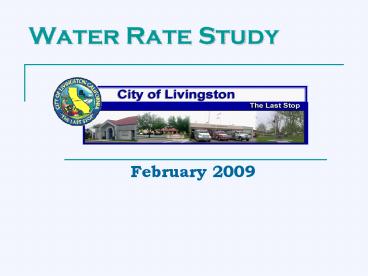Water Rate Study - PowerPoint PPT Presentation
Title:
Water Rate Study
Description:
... Coverage Summary Operations Reserves Ending Balances Combined Reserves Ending Balances Cost of Service Methodology AWWA Base Extra Capacity Method: ... – PowerPoint PPT presentation
Number of Views:53
Avg rating:3.0/5.0
Title: Water Rate Study
1
Water Rate Study
- February 2009
2
Agenda
- Current Financial Situation
- Current Water Rates
- Water Rate Study
- Rate Study Process
- Financial Plan
- Methodology
- Results
- Impacts
- Discussion
3
Current Financial Situation
4
Current Financial Situation
Water rates last updated 1995
Water revenues under existing rates 1.1M
Annual OM 1.78M
Total CIP (FY 2010 2014) 11.6M
Existing debt service 77K
New debt service (4.2M in 2011, 3.5M in 2013) by FY 2013 501K
Water Enterprise Fund deficit (end FY 2009) 1.15M
5
Cash flows Large DeficitUnder Existing Rates
Assuming no rate adjustments made
6
Reserves Huge Deficit Under Existing Rates
Assuming no rate adjustments made
7
Projected Capital Improvement Plan (CIP)
8
Current Water Rates
9
Current Water Rate Structure
10
Current Water Rate Structure
11
Monthly Bills Comparison Chart
12
Water Rate Study
- Process
- Financial Plan
- Methodology
- Results
- Impacts
13
Rate Study Process
14
Water Usage Characteristics
15
Proposed Rate Adjustments
16
Operating Financial Plan
17
Debt Service Coverage Summary
18
Operations Reserves Ending Balances
19
Combined Reserves Ending Balances
20
Cost of Service Methodology
- AWWA Base Extra Capacity Method
- Base costs Costs of serving water under average
conditions - Peaking costs Maximum day and maximum hour
costs - Service charge Customer service costs Meter
capacity costs
21
Peaking Factors
22
Proposed Rates Service Charges in FY 2010
23
Single Family ResidentialBill Frequency Analysis
24
Proposed RatesWater Usage Rates in FY 2010
25
Proposed Rates Scenario 1
26
Proposed Rates Scenario 2
27
Proposed Rates Scenario 3
28
Customer Impacts
Test year FY 2010
29
Rate Survey Results
30
Comparison of 3 Scenarios
Scenario Rate Adjustments Scenario 1 200, 3, 3, 3, 3 Scenario 2 125, 40, 6, 6, 6 Scenario 3 72, 50, 50, 3, 3
PROS High debt coverage ratio Positive reserves by FY2011 Smallest long-term customer impacts High debt coverage ratio Medium customer impacts Positive reserves by FY2011 Smallest initial customer impacts (in FY2010)
CONS Greatest initial customer impacts (in FY2010) Largest long-term customer impacts (by FY2014) Low initial debt coverage ratio Deficit continues until end FY2011
31
Discussion
32
Cash flows Large DeficitUnder Existing Rates
33
Reserves Huge Deficit Under Existing Rates
34
Projected Capital Improvement Program (CIP)
35
Revenues from Existing Rates
36
Projected Cash Outflows































